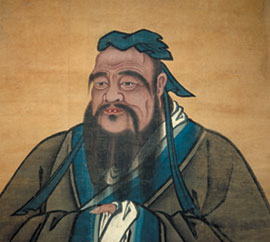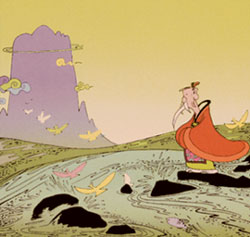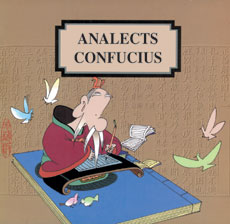
About 2500 years ago, in what was called the Spring and Autumn Period (770-476 BC), there was born a great thinker and teacher in China -- Confucius (551-479BC).
Confucius' Time
The Spring and Autumn Period was a time of great political, economic and social changes. The king of the East Zhou Dynasty continued to reign over the country, but in name only, for he had little real power. The strongest of his vassals, like the dukes of the states of Qi, Jin, Qin, Chu, Wu and Yue, enjoyed hegemony one after another, and were more powerful and influential than the king. Wars broke out from time to time between the states with the results of many small states being annexed by the big ones. Within the states power struggle, usurpation, assuming undue titles or positions, and assassination were frequent,
In the economic field, agricultural production rose markedly mainly because the use of iron tools had begun. The land system inherited from the West Zhou could hardly be maintained, as the serfs were interested only in working their own private fields, and reluctant to till the "public fields," for which they got nothing. Gradually the feudal lords who owned the land realized that they could get more by dividing the public fields among the serfs in return for taxes. This paved the way for the landlord-tenant relationship. Along with the growth of agriculture, handicrafts and commerce developed. In big cities emerged rich merchants who were even capable of maintaining contacts with ruling princess or dukes, and bringing influence to bear upon them.
These political and economic changes were certain to affect the thinking and attitudes of all people. The rulers of the states, without exception, tried hard to make their states rich and while the common people, groaning under the heavy burden of military service and taxation, desired above all peace and survival. A new category of people, the scholars, appeared. They came from various backgrounds and had studied social and political problems and all kinds of tactics. Some of them, employed by rules of states, gave their masters advice on how to deal with difficult situations. A few went a step further to explore the basic laws of nature and society, and engage in philosophical research, Of these the most outstanding were Confucius and Laozi, who laid the foundations for the Confucian and Taoist schools of thought. During the Warring States Period (475 22l BC) that followed, there were many more scholars interested in philosophical studies. They brought about "the contention of a hundred schools of thought" described in historical works.
Confucius' Life
Kong Qiu, whose courtesy name was Zhongni, was born in the state of Lu in the south of present-day Shandong Province. Confucius was his Latinized name used in the West ever since he was known abroad.
When Confucius was three years old, his father, a warrior, died. He and his mother moved to Qufu, the capital of Lu. In his childhood he showed a great interest in learning, and his mother, though hard up, did everything possible to enable him to study. Lu had a richer cultural heritage than many other states. Shortly after the West Zhou was founded, Lu had been given to the Duke of Zhou, whose name was Ji Dan, as his fief. The duke had been one of the main designers of the institutions and regulations, including the rites, of the West Zhou. During the Spring and Autumn Period, the rites and other institutions of the West Zhou were rapidly losing their influence, but it was said that they could be seen in Lu. Growing up in this cultural environment, and being an industrious learner, Confucius gradually became a famous scholar.
“I was established at thirty", Confucius said of himself. Probably at that time he had studied the most important classics and formed his own beliefs or philosophy. Henceforth he took it as his mission to spread his views and his main method was education. Upholding the principle of giving education to everyone without making any distinctions, he accepted as his students all those who came to learn from him. Thus he broke the monopoly of education by the nobility before his time and made education accessible to all men. This was an event which was to have a far-reaching positive influence on the development of Chinese culture. It has been estimated that in his lifetime he taught all together about 3,000 students, 72 of whom had outstanding achievements in various fields.
In view of his prestige, the rulers of Lu decided to employ his service in the government, and appointed him the magistrate of a county, then the chief of public security, and finally acting prime minister, responsible for the work of the government.
However, serious differences developed between him and the nobles who had real power. They were opposed to his principles of government. Because of this he decided to leave Lu when he was 55 years old. Accompanied by a few faithful students, he visited within 14 years about ten states and talked with six rulers about his ideals of humane government, but none of them were interested. During his travels more than once he met with grave difficulties and danger, but he was always optimistic and at ease, giving instructions whenever possible to the students traveling with him, or playing the zither and singing.
During these years the state of Lu had come under the control of a new generation of nobles, and many of Confucius’s students had become important government officials to the state of Wei,swheresConfucius was then staying, to invite him back to Lu, and he returned home. That year he was 68 years old.
After his return, he continued teaching and edited ancient classics. His wife had died a year before, and his only son, Kong Li, had also died. In 479 BC Confucius fell ill and died at the age of 73.
Confucius's Thought
Confucius was the first thinker in China’s intellectual history to consider moral standard as the first and highest criterion of man’s behavior and government. The core of morality, according to him, is humanity (humaneness or benevolence).”To be humane is to be a man,”he said. This shows that in his view it is the quality of humanity that makes a man a man. He pointed out that humanity meant to“love other men”to“help others to be established when one wishes to be established oneself and help others to be successful when one wished to be successful oneself ,”and“not to impose on others what one does not desire oneself”.
How beautiful and happy the world would be if every person were humane and loved other people! At the same time, a humane mind would free one from greed, ambition, and all selfish or evil ideas, and enable one to live a lofty, happy, full and meaningful life, at peace with the world and make it possible for one to realize the value of being a man.

In connection with humanity, Confucius mentioned many other virtues, such as rightness propriety, wisdom, trustworthiness, loyalty, filial piety, brotherly love, reciprocity, reverence, resoluteness, perseverance, simplicity, reticence, mildness, respectfulness, thrift, politeness, and so on. A great number of Confucius' sayings recorded in The Analects are connected with moral principles.
Confucius valued the function of the rites. They were rules of ceremonies and standards of behavior formulated by the founders of the West Zhou to regulate and adjust the relations among nobles. The principle that“the rites do not apply to the common people and punishments do not apply to the nobles" showed that both the rites and punishments were used to maintain socialsgroupsand stability, though with different categories of people. During the Spring and Autumn Period the rites were seldom followed, but Confucius wanted to have them revived and practiced. "Humanity means to restrain oneself and observe the rites," Confucius said. Thus he links the rites to humanity: the thought of humanity should find expression in behavior that conforms to the rites.
Moral principles also apply to government. In the first place, the ruler should be a virtuous man himself :”A man who is not upright is not obeyed even if he gives orders.”The common people should be governed in a humane way: they should be made rich and educated; and should not be suppressed with punishments.
Confucius was China’s first educator. He taught students all his life, and put forward many important educational principles and effective teaching methods. He said that all men were educable, because by nature men were quite alike, and they were made different by learning and practice. This was in his day an epoch-making view, because it meant that only receive education. His teaching methods included the eliciting method, giving instructions according to students’peculiarities, and combining theory with reality and practice. To deepen his students’understanding, he discussed with them real people and events of earlier times and his day, expressing his own views making analyses, pointing out their strength and weakness, and urging his students to weigh and decide issues. It was regrettable that the master was not free from prejudices against women and never accepted a female student.
What he taught was mainly ancient classics and moral tenets. He expected his students to understand history and society and become useful men of moral integrity. It was a kind of liberal or General; the teaching of specific skills was excluded.
Confucius had high praise for the mean, calling it a“perfect virtue”, and was opposed to excesses and one-sidedness, and going too far and falling short. This is in keeping with the general laws of the working of things. He was for harmony and against uniformity. As a matter of fact, human society and nature alike are composed of a great variety of people and things. It is just because there is harmony among them that society and nature are able to exist and develop. Confucius taught his students to concern themselves with reality, to face the world and life, and not to waste time on unreal things. Ji Lu asked about serving ghosts and spirits. Confucius said,“How can we understand death when we do not understand life?”He urged his students to do what should be done for the common people, and show reverence to ghosts and spirits but keep them at a distance. These are all very practical and beneficial instructions.
Confucius stressed the importance of filial piety and brotherly love, or the importance of the family. You Zi, one of his main disciples, even called filial piety and brotherly love the foundation of humanity. These views helped to strengthen the Chinese peoples’attachment to the family.
During the Spring and Autumn and Warring States Periods, the school started by Confucius was one of the contending schools of philosophy. Owing to its great influence, it was called a“prominent school of learning.”In 140 BC Emperor Wudi of the West Han Dynasty, on Dong Zhoushu’s recommendation, decided to“exalt Confucianism to the exclusion of all other schools of thought.”Subsequent rulers of the Han and other dynasties, with few exceptions, followed suit, and made special efforts to promote Confucian thought. The civil service examinations, which started in the Sui Dynasty, generally made the Confucian classics the main source of the questions or topics. The result was that most government officials believed in Confucianism. From the time of Emperor Wudi down to the founding of the People’s Republic in 1949,except for short interruptions, Confucianism was the main stream of Chinese thought for as long as 2000 years. People of all classes, from emperors and ministers to peasants and craftsmen, were to varying degrees influenced by Confucianism. Most scholars studied and believed in Confucius and most publications propagated his theories. This in a way ensured the continuous development of Chinese culture.
Today, in China and many other countries, the study of Confucianism is rapidly growing. It is generally agreed that the essence or many elements of Confucianism are still valid and valuable, worthy to be adopted and promoted. It is an antidote to many social ills and a spiritual force that may help to improve human qualities and push society forward. Some scholars have predicted that in the next century Confucius’thought will exert greater influence on mankind and become more glorious than ever before.
Analects
Confucius did not write any book., perhaps because it was not yet a custom in his time for one to write for publication; or because Confucius considered it his mission to“interpret and not to create," and therefore he would not create any new theory, though in fact he did. Fortunately there is a book which records his own words–Sayings Discussed, generally translated as The Analects. This is naturally the most reliable material for the study of Confucius' thought.
How did this book comesintosbeing? In“Records of the Classics and Other Works" of Ban Gu's History of the Han is the following explanation:
Saying Discussed (The Analects) records Confucius’answers to questions raised by students and men of his time, and conversations between his students on the master’s sayings. Students took notes separately and, after the master’s death, they discussed, collected and complied his sayings, so the book was called Saying Discussed (The Analects).
This remarks tells us that The Analects is a book compiled after discussion by his disciples, and probably his disciples' disciples, who had taken notes of what their master and his main disciples had talked about.

The book is faithful and reliable because it is based on the notes taken by the students of what their teacher had said. At the same time, it is only natural if there are in it some repetition of the notes taken by different students.
In the book there are all together about 490 sayings of Confucius and his main disciples. These are dividedsintos20 sections, in about 12,700 words. They discuss a wide range of subjects: morality and rites, government and law, education and learning, knowledge and practice, music and poetry, the gentlemen’s qualities and the small man’s weaknesses, the will of Heaven and destiny, the mean, the way of self-cultivation, and the right attitude toward ghosts and spirits. In addition, there are a few entries describing Confucius' personality and lifestyle. In size it is a small book, but it contains immeasurable wisdom. It was like a torch that lit up the path of the Chinese people for centuries, because, in spite of its limitations, it distinguished between right and wrong. The Chinese people’s appreciation of the book and Confucius is poetically expressed in the following two lines written by a scholar of the Song Dynasty: "Had heaven not produced Zhongni (Confucius), there would be eternal night."
|
![]() 本网站由北京信息港提供网络支持
本网站由北京信息港提供网络支持


